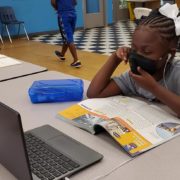How to Recover at Home from COVID-19

By Michelle Udayamurthy, M.D., Internal Medicine, Kelsey-Seybold Clinic – Berthelsen Main Campus
Most people with COVID-19 have mild illness and should be able to recover at home. Many people diagnosed with COVID-19 may improve over time with supportive treatment to relieve symptoms. If you are ill do not leave your home except to get medical care.
Based on what we know today, COVID-19 spreads between people through respiratory droplets when they are speaking, coughing and sneezing, this is why social distancing remains important to slow the spread of the virus.
If possible, the patient recovering at home should separate and isolate themselves from others. If there are multiple restrooms in the home, using a separate bathroom from others may help prevent the spread of the virus.
It is very important to engage in a heightened level of personal hygiene and protection during this time, including more frequent hand washing [at least 20 seconds duration], try not to touch your eyes, nose or mouth with unwashed hands, more frequent cleaning and disinfecting of all surfaces touched or nearby the individual with the virus, using separate bedding and linens – and washing linens and clothing separately in hot water. Please avoid sharing household items and consider using disposable plates and utensils for eating.
When tending to an individual with COVID-19, the patient and caregiver should wear face masks and gloves for added protection. The CDC recommends that even homemade fabric masks provide some increased protection from spread.
Once isolated, supportive treatments may begin, including:
- Rest at home
- Drinking a lot of fluids to stay hydrated
- Taking over-the-counter medications for fever and muscle aches, like acetaminophen, and cough medicines as directed by your healthcare provider
If symptoms worsen, emergency medical care may be needed. Some symptoms to watch out for may include:
- Difficulty breathing
- Persistent pain or pressure in the chest
- New confusion or ability to arouse
- Blueness of the lips or face
Monitor symptoms and seek medical attention if the illness is worsening i.e. difficulty breathing. It is important to call the patient’s healthcare provider for guidance. Put on a facemask before you enter the health care facility. If a trip to the hospital by ambulance is necessary, phone and alert EMS to the coronavirus infection.
According to the CDC patients with confirmed COVID-19 should remain under home isolation precautions until the risk of secondary transmission to others is thought to be low. The decision to discontinue home isolation precautions should be made on a case-by-case basis in consultation with your health care provider.























